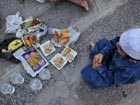| Videos | ? Latest |
|
? Feature | ? Sports | ? Your Videos |
Water, electricity shortages plague Tripoli

 0 Comment(s)
0 Comment(s) Print
Print E-mail
CNTV, August 29, 2011
E-mail
CNTV, August 29, 2011
The five-month war in Libya is thought to have claimed the lives of more than 20,000 people, and left a further 70,000 injured. Cities across the country bear the tell-tale scars of war, while continuing instability in the capital means thousands are dealing with water and electricity shortages.
|
Libyan rebels are seen on the road out of Misrata, 118 miles (190 kilometers) from Sirte, Libya, Saturday, Aug. 27, 2011.[CNTV] |
Life remains far from normal in Tripoli.
Sporadic bursts of gunfire echo around the city, though much of the street fighting has died away.
Tripoli's two million residents now face a new battle, with a breakdown in basic services.
Many market stalls lie deserted or destroyed. And with Libyans preparing for Eid, the end of the fasting month of Ramadan, there is little to buy.
A Tripoli resident said, "We're calling on the rebels to open shops and markets. We can't find food or water or anything. We want the market to open again, and life to return to normal,"
With hospitals also running low on stocks, Libya's National Transitional Council is calling for help from the international community.
Mustafa Abdul Jalil, Chairman of National Transitional Council, said, "We're making an urgent appeal to international humanitarian organizations. Tripoli is in desperate need of medical supplies, especially emergency operational equipment, surgical equipment and basic food."
The transitional council says it's confident of getting water and electricity supplies switched back on Sunday.
Telecommunications and medical supplies are also due to arrive in the city within days.
And on Monday, the council is expecting to resume operation at Libya's biggest oil refinery in Zawiyah, to the west of the capital.
Despite the drop in fighting, security in Tripoli is still a concern, with checkpoints on most major roads. There are reports that Gaddafi loyalists have been randomly shooting at rebels and civilians.
With billions of dollars in released frozen assets still to arrive, the NTC has not ruled out the possibility of inviting in police forces from other Arab countries.
Go to Forum >>0 Comment(s)
 Add your comments...
Add your comments...
- User Name Required
- Your Comment
- Racist, abusive and off-topic comments may be removed by the moderator.


![Libyan rebels are seen on the road out of Misrata, 118 miles (190 kilometers) from Sirte, Libya, Saturday, Aug. 27, 2011.[CNTV] Libyan rebels are seen on the road out of Misrata, 118 miles (190 kilometers) from Sirte, Libya, Saturday, Aug. 27, 2011.[CNTV]](http://images.china.cn/attachement/jpg/site1007/20110829/001ec94a1ee40fc532950c.jpg)



